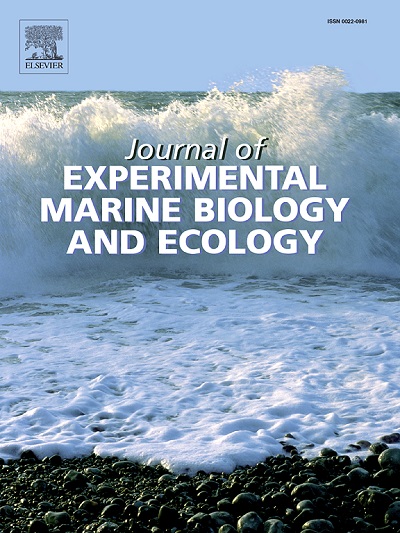Physiological effects of acute exposure to acidification conditions in embryos of the American lobster (Homarus americanus)
IF 1.8
3区 生物学
Q3 ECOLOGY
Journal of Experimental Marine Biology and Ecology
Pub Date : 2025-03-07
DOI:10.1016/j.jembe.2025.152095
引用次数: 0
Abstract
Ocean and coastal acidification are altering carbonate chemistry conditions and inducing physiological stress in marine organisms. Early life history stages of marine invertebrates, including commercially important species like the American lobster (Homarus americanus) may have limited physiological capacity to tolerate changes in carbonate chemistry. Using American lobster embryos, we quantified physiological disturbances caused by acute changes in carbonate chemistry. We exposed freshly isolated lobster embryos to conditions ranging from 6.94 to 8.07 pH for 24 h at three points during embryo development. With more extreme conditions of acidification, protein carbonyl concentration (indicative of cellular damage from oxidative stress) increased, and Na+/K+-ATPase activity (associated with acid-base regulation) decreased at all stages of development examined. Although oxygen consumption rate and ferric-reducing antioxidant potential both increased over the course of embryogenesis, we found no evidence that the relationship between pH and these physiological metrics varied during ontogeny. Our results indicate that acid-base regulation and oxidative stress in American lobster embryos may be sensitive to acidification-induced hypercapnia within a 24-h period across a large portion of embryo development.
急性酸化条件下美洲龙虾胚胎的生理效应
海洋和海岸酸化正在改变碳酸盐的化学条件,并引起海洋生物的生理应激。海洋无脊椎动物的早期生活史阶段,包括商业上重要的物种,如美洲龙虾(Homarus americanus),可能具有有限的生理能力来忍受碳酸盐化学的变化。利用美国龙虾胚胎,我们量化了碳酸盐化学急剧变化引起的生理紊乱。我们将新鲜分离的龙虾胚胎在胚胎发育的三个时间点,在pH值为6.94 ~ 8.07的条件下暴露24小时。在更极端的酸化条件下,蛋白质羰基浓度(表明氧化应激引起的细胞损伤)增加,Na+/K+- atp酶活性(与酸碱调节相关)在所有发育阶段都下降。尽管在胚胎发生过程中,氧气消耗速率和铁还原抗氧化能力都有所增加,但我们没有发现pH值与这些生理指标之间的关系在个体发育过程中发生变化的证据。我们的研究结果表明,美国龙虾胚胎的酸碱调节和氧化应激可能在胚胎发育的大部分时间内对酸化诱导的24小时高碳酸盐岩敏感。
本文章由计算机程序翻译,如有差异,请以英文原文为准。
求助全文
约1分钟内获得全文
求助全文
来源期刊
CiteScore
4.30
自引率
0.00%
发文量
98
审稿时长
14 weeks
期刊介绍:
The Journal of Experimental Marine Biology and Ecology provides a forum for experimental ecological research on marine organisms in relation to their environment. Topic areas include studies that focus on biochemistry, physiology, behavior, genetics, and ecological theory. The main emphasis of the Journal lies in hypothesis driven experimental work, both from the laboratory and the field. Natural experiments or descriptive studies that elucidate fundamental ecological processes are welcome. Submissions should have a broad ecological framework beyond the specific study organism or geographic region.
Short communications that highlight emerging issues and exciting discoveries within five printed pages will receive a rapid turnaround. Papers describing important new analytical, computational, experimental and theoretical techniques and methods are encouraged and will be highlighted as Methodological Advances. We welcome proposals for Review Papers synthesizing a specific field within marine ecology. Finally, the journal aims to publish Special Issues at regular intervals synthesizing a particular field of marine science. All printed papers undergo a peer review process before being accepted and will receive a first decision within three months.

 求助内容:
求助内容: 应助结果提醒方式:
应助结果提醒方式:


